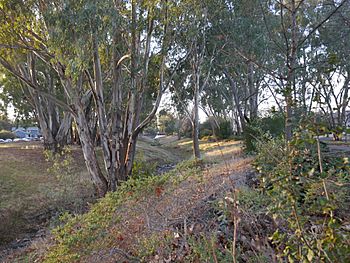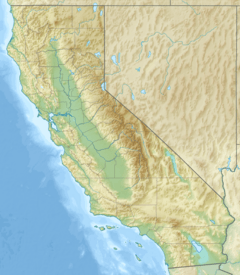Arroyo Seco (Alameda County) facts for kids
Quick facts for kids Arroyo Seco |
|
|---|---|

Arroyo Seco west of Sandia National Laboratory in Livermore
|
|
|
Location of the mouth in California
|
|
| Country | United States |
| State | California |
| Region | Alameda County |
| City | Livermore |
| Physical characteristics | |
| Main source | spring 8 mi (10 km) southeast of Livermore 1,990 ft (610 m) 37°39′57″N 121°36′51″W / 37.66583°N 121.61417°W |
| River mouth | Arroyo Las Positas north of Livermore 482 ft (147 m) 37°42′20″N 121°45′23″W / 37.70556°N 121.75639°W |
The Arroyo Seco is a stream in Alameda County, California. It is about 11.7-mile-long (18.8 km). The stream flows through the city of Livermore. It eventually empties into another stream called Arroyo Las Positas.
The name Arroyo Seco comes from the Spanish words for "dry stream." This name suggests that the stream might not always have water flowing in it, especially during dry seasons.
Contents
What is the Arroyo Seco Watershed?
The Arroyo Seco is part of a larger area called the Arroyo Seco watershed. A watershed is like a big bowl. All the rain and water that falls in this area eventually flows into the Arroyo Seco.
This watershed includes the eastern part of Livermore city. It also covers the area around the Sandia National Laboratory.
Understanding Subbasins
The Arroyo Seco watershed is part of an even bigger system called the Livermore Valley watershed. Inside the Livermore Valley watershed, there are smaller sections called subbasins.
The largest of these is the Mocho Subbasin. It's like a smaller bowl within the bigger watershed bowl.
How Faults Affect Water Flow
The Mocho Subbasin has natural boundaries. To the west, it's bordered by the Livermore Fault Zone. To the east, it's bordered by the Tesla Fault. A fault is a crack in the Earth's crust where rocks have moved.
Sometimes, water that is underground, called groundwater, can flow across these faults. However, the flow of water can be broken or "discontinuous" deeper than 50 feet (15 m) near the Tesla Fault. It's also discontinuous south of the Arroyo Mocho channel near the Livermore Fault. This means the faults can act like barriers to underground water movement.
Protecting Local Wildlife
The Arroyo Seco watershed is home to many different kinds of plants and animals. Some of these species are very special. They are considered threatened or endangered species.
- Threatened species means they might become endangered in the future.
- Endangered species means they are at high risk of disappearing forever.
It's important to protect this watershed to keep these special animals and plants safe.


